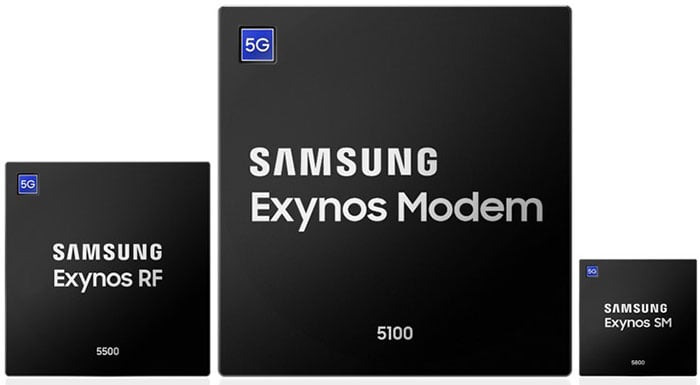Samsung Begins Mass Production Of Exynos 5100 5G Modem For Smartphones

Samsung is now producing its previously-introduced Exynos Modem 5100 and a new single-chip frequency transreceiver, the Exynos RF 5500, on a mass scale, the company announced on Thursday. In addition, it is also begun large scale manufacturing of a supply modulator solution, the Exynos SM 5800, for a complete 5G package.
All three of those chips support the 5G New Radio (5G-NR) sub-6-gigahertz (GHz) spectrum, as well as legacy radio access technologies. In plain English, Samsung is offering smartphone makers a pathway to 5G connectivity, while maintaining backwards compatibility with 4G LTE, on a single chip. This means we should start seeing more 5G-capable smartphones in the near future.
"Samsung has been an innovator in mobile communication technologies with a strong portfolio of market-proven solutions, and we are well-prepared to extend our leadership into 5G," said Inyup Kang, president of System LSI Business at Samsung Electronics. "Our multi-mode solutions, the Exynos Modem 5100, Exynos RF 5500 and Exynos SM 5800 will together enable powerful yet energy-efficient 5G performance along with the network versatility that allows users to stay connected wherever they are."
The Exynos Modem 5100 is Samsung's first 5G modem solution to have completed preparations for commercialization in August of last year, having successfully made an over-the-air (OTA) 5G-NR data call test. Samsung says the chip supports "virtually all networks. Having a single chip solution also keeps costs down, making it easier for smartphone makers and consumers alike to take the leap into 5G territory.
Samsung's new modem delivers maximum download speeds of up to 2 gigabits per second (Gbps) in 5G's sub-6GHz settings, and 6Gbps in mmWave settings. The latter is around five times faster than its predecessor. Samsung previously said that fast and stable communication can also be secured in 4G networks, with download speeds of up to 1.6Gbps.

Even with these new hardware solutions being mass produced, it will be some time before 5G connectivity is ubiquitous. Wireless carriers are working on rolling out 5G networks. South Korea has bragging rights in this regard, as it will become the first to commercially roll out a 5G network this Friday. In the US, all four major wireless carriers have 5G plans, but it will probably be at least a year or more before we see widespread availability.
In the meantime, smartphone makers can arm themselves with 5G solutions. Samsung is one of the first out of the gate with its Galaxy S10 5G, which as the name implies is a 5G-enabled version of its flagship Galaxy S10.

